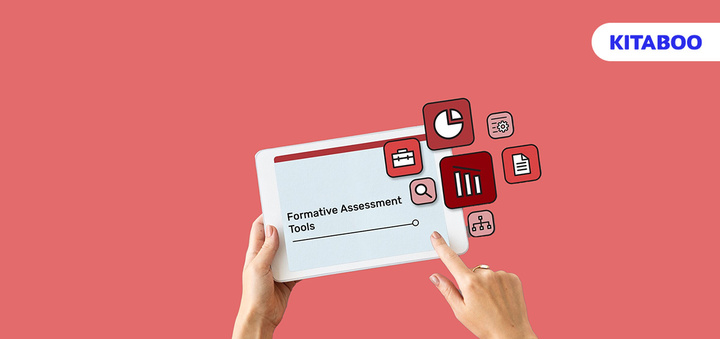
Enhance Student Engagement with Interactive Formative Assessment Tools
Formative assessments are a valuable tool for educators to gauge the impact of their lessons and adjust their pedagogy accordingly. These exercises facilitate the identification of pedagogical strengths and weaknesses and also help evaluate students’ understanding of the lesson content.
However, despite the many benefits of formative assessments, one major challenge persists: how can educators make tests engaging and interactive to capture students’ attention and collect accurate feedback? This is where digital textbook platforms like KITABOO come in.
Apart from specializing in digital textbook publishing, KITABOO offers several innovative formative assessment tools to help educators monitor and enhance student learning.
This blog will explore how you can leverage interactive formative assessments to engage and augment student learning.
Table of Contents
I. What are Formative Assessments, and Why are they Important?
II. Why Does Student Engagement Matter?
III. How Can Formative Assessment Tools Help?
- Enhancing Assessment Variety
- Customizing Assessments
- Delivering Immediate Feedback
- Boosting Student Engagement Through Accessibility Enhancements
What are Formative Assessments, and Why are they Important?
Formative assessments, unlike their high-stakes summative counterparts, are designed to test students’ understanding throughout a lesson. The principal goal of this exercise is to give educators critical insights into:
- What subjects or topics are students struggling with?
- The strengths and weaknesses of individual students.
- Which of their teaching methodologies resonate better with their students and prove to be more effective?
In essence, formative assessments equip educators with critical information on developing a higher quality of education and delivering better learning outcomes.
Why Does Student Engagement Matter?
Formative assessments do not carry real-world consequences for students, such as a permanent mark on their academic records or college placements. That said, they do hold significant value in other aspects.
Student engagement refers to the level of interest or involvement in learning. Although this term is typically associated with and used in the context of teaching, it also plays a critical role in assessments.
With heightened levels of student engagement in formative assessments,
- Students will develop a sense of ownership and become more self-regulated learners. Higher engagement will lead to a better understanding of where students must concentrate their efforts to perform better in their summative assessments.
- They will respond to formative assessments seriously, which will help educators collect accurate data about their learning progress.
The “low-stakes” nature of these tests, combined with heightened levels of engagement, will automatically create a positive, anxiety-free environment. Here, students can transcend the fear of failure and learn from their mistakes, leading to a richer learning experience.
How Can Formative Assessment Tools Help?
Formative assessment tools are applications or platforms that specialize in creating, delivering, and managing formative assessments. They offer numerous advantages over traditional assessment formats, such as:
Enhancing Assessment Variety
Formative assessment tools can improve student engagement levels in numerous ways:
- They allow educators to create formative assessments in multiple formats, such as instant quizzes embedded in learning videos, MCQs, drag-and-drop questions, etc., which are significantly more interesting, involving, and engaging than writing on paper.
- They can also be infused with elements of gamification – a proven method of increasing student engagement that is rapidly gaining traction in the field of education.
Customizing Assessments
Personalization has become common in the field of education. This shift is primarily due to the abundance of conclusive evidence that a one-size-fits-all approach to teaching is not the best way forward.
The same holds true for assessments. Not every student will respond to a specific assessment format similarly.
The formative assessment tools of today can analyze students’ responses and patterns to adapt assessments in a manner that works best for them. This personalized approach ensures students are challenged appropriately, are not disheartened or feel lost, and maintain constant engagement through the assessment.
Delivering Immediate Feedback
There is no better time than the present. This saying is especially true in the context of educational assessments. Providing instant feedback while students are still focused on the topic is essential. It helps them pinpoint areas that require more work and gives them the resources to understand concepts better. This ensures students comprehensively understand the material before tackling more complex subjects.
KITABOO’s formative assessment tools allow educators to create interactive workbooks integrating instant feedback features in quizzes and MCQs.
Boosting Student Engagement Through Accessibility Enhancements
In traditional education, students with disabilities frequently experience disengagement or reduced motivation when they have to complete formative assessments that put them at a significant disadvantage.
Modern formative assessment tools address this complication with features like text-to-speech functionality, adjustable font sizes, the ability to alter color and contrast, and more. This level of inclusivity will positively impact the engagement levels of all students.
Benefits of Formative Assessment Tools for Educators
Educators, too, can reap multiple benefits from formative assessment tools. The chief among them are:
Real-Time Data Insights
Formative assessment tools generate valuable data and analytics in real-time, which can help educators track student progress and provide feedback or assistance when needed.
Some of these tools also come with the ability to integrate with modern Learning Management Systems (LMS) seamlessly. When combined, these digital assessment solutions can give educators a holistic view of every student’s learning journey.
Reduced Workload
These tools can save educators significant time and effort by automating every aspect of formative assessment activities – from assessment creation and delivery to grading.
For example, KITABOO uses an AI assistant called K.AI that can do anything from creating Flashcards and lesson summaries to MCQs in seconds. This technology saves valuable time for teachers, allowing them to allocate it more effectively.
Also Read: K-12 Education Digital Content
Summing it Up
Formative assessment tools are nothing short of revolutionary. They offer many benefits for students and educators alike and are the key to unlocking a world of possibilities in the classroom to improve student engagement.
In short, these tools represent the future of education, and their integration into educational institutions is recommended to enrich the teaching and learning experience.
Contact us to learn more.
Suugested Reads:
Discover how a mobile-first training platform can help your organization.
KITABOO is a cloud-based platform to create, deliver & track mobile-first interactive training content.



